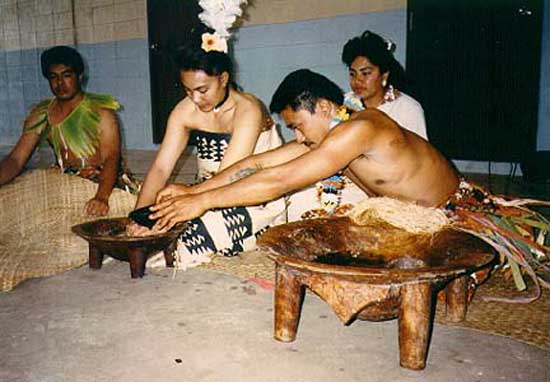
Arturo Giron Leaves to Head Peace Corps Mission in Tonga
ORS Official Leaves to Head Peace Corps Mission
By José Alvarado
This month, the Kingdom of Tonga will receive a new resident with NIH expertise. Arturo Giron of the Office of Research Services left NIH July 10 to prepare for his new post as country director of the Peace Corps mission in this South Pacific archipelago-nation of just over 100,000 inhabitants. He will be the highest-ranking U.S. official there.
Giron's departure from his position as assistant director for quality development at ORS culminates a 10-year tenure at NIH. During this time he oversaw implementation of policies that improved the quality of a range of ORS services, as well as the management of an apprenticeship program which, in its 20 years of existence, trained over 80 journey-level mechanics including carpenters, plumbers, electricians and electronic technicians. Colleagues expressed sadness over his leaving, but wished him well in his new undertaking.
Arturo Giron
Giron recently relocated to Tonga with his wife and 2-year-old daughter after a month-long training program. The family will start a new life, learning a new culture and adapting to a tropical environment. The Kingdom of Tonga is one of the last monarchies in the world. Of 170 islands in the archipelago -- located in the area between Fiji, Samoa and New Zealand -- 36 are inhabited, the largest one being Tongatapu.
The Peace Corps, established by President John F. Kennedy in 1961, has had missions in 132 nations. Since its inception, 150,000 volunteers and trainees have worked in community projects in the areas of education, environment, health, business, agriculture and housing. Currently, the corps has about 6,500 volunteers working in the field in 84 countries. Assistance is provided to underdeveloped countries that face economic and social problems.
Despite economic growth, Tonga is beset by difficulties facing many small island nations. A large youth population and a shortage of teachers predict limited opportunities for future generations of islanders.
"My wife and I have been talking about this for a couple of years. We decided that if we were going to do international work, it would be now. I feel that I am young enough and that I have a lot of energy to devote to an overseas program like this. Being a country director for the Peace Corps is the kind of job that probably requires not just experience, but physical stamina as well," he said.
For Giron, who was born in Cuba and whose family emigrated to the United States in 1962, it would not be the first time he has led an endeavor overseas. While in graduate school in entomology during the late 1970's and early 1980's, he headed a scientific project in Peru, funded by the Department of Agriculture, to find biological agents that could be used to control the Mexican bean beetle, which feeds on soybeans and lima beans, two major crops in the Delmarva peninsula. His latest foray into the Peace Corps follows a long-held desire to "help other people who do not have the advantages we take for granted" and contribute his "creativity, energy, perhaps a little bit of idealism from my youth" for a humanitarian cause.
He paralleled Peace Corps aims with the NIH mission. "Everybody talks about the NIH as being a jewel on the crown of the U.S. government. NIH is the place where miracles occur. The Peace Corps is like that as well; it's another jewel on the crown of the government. Its entire mission is to do good," said Giron. He also mentioned personal satisfaction and challenges to be derived from the job. "I have several friends who were Peace Corps volunteers and they felt they had made a difference. They came back with a wealth of experience and knowledge, and exposure to diverse cultures. They came back better people and more ready to tackle the big challenges."
Giron's experience at NIH will certainly come in handy in what is basically a management job in a foreign setting. His first ties to NIH were developed in the mid-1980's, when he started teaching technical mathematics at Montgomery College to technicians from a variety of government agencies including NIH. In 1985, he was appointed director of apprenticeship and technical training for Montgomery College. Three years later, Giron was hired by the director of the Division of Engineering Services to be assistant director for training and employee development. He was promoted to assistant director for quality in DES in 1991. Finally, in 1995, he became assistant director for quality development for ORS.
The road Giron is about to embark on is like no other road he has taken before. "This is not like simply switching jobs. I am selling my house, putting my furniture in storage, and moving my family to a different country with a completely different culture. This is not changing corporate hats; this is changing the focus of your life," he concluded.
